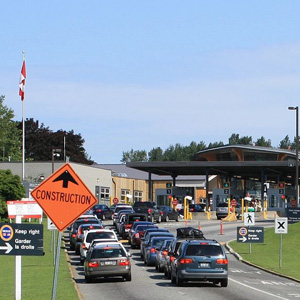In early December, the United States’ Congress adopted new legislation aimed at expediting the movement of people and goods between Canada and the USA. The passing of the ‘preclearance bill’ was greeted happily by members of both countries’ governments.
“Great news,” tweeted Canadian Prime Minister Justin Trudeau. “One step closer to easier travel and trade between our countries.”
Two pilot projects will be initiated under the new legislation, one at Montreal’s Central Station and another with the Rocky Mountaineer train line in Western Canada. The projects will involve the establishment of United States customs offices on Canadian soil at border crossings, which is expected to speed up screening and reduce congestion.
The bi-national effort, which has involved both the Trudeau Liberals and Stephen Harper’s Conservative government, was initiated to ease border log-jams following 9/11, without sacrificing security.
“Canada is more than just a bordering nation,” said Rep. Elise Stefanik, a congresswoman from New York, in the wake of the bill’s adoption. “They are our neighbors, our friends and our largest trading partner. Plattsburgh, a city in my district, has even branded itself as Montreal’s U.S. suburb.
What’s next?
Although delighted with the Americans’ eagerness to improve border relations, the Government of Canada has yet to approve its own preclearance legislation, Bill C-23. The Bill ‘has been introduced by the Liberal government, and is expected to have broad support in the House of Commons,’ according to the National Post.
Legal implications
The impending pre-clearance agreement between Canada and the USA is good news for businesses and tourists, but some leading Canadian immigration lawyers have found reasons for concern, including proposed limitation of a person’s right to withdraw from preclearance areas; the increased power of customs officers to detain and question individuals; and changes to ‘the provision that currently prohibits security officers from the U.S. working on Canadian soil from doing body searches of people in preclearance without their Canadian colleagues being notified and present,’ Canadian Lawyer magazine reports.
Another element of the proposed Preclearance Act which could keep Canadian immigration lawyers busy is s. 48(4), which would allow border officials to turn away permanent residents of Canada if the officials find that the person has not met his or her residency requirements.
“The new legislation would authorize officers to prepare a report outlining the relevant facts should they believe a foreign national or permanent resident is inadmissible under Immigration and Refugee Protection on grounds to be specified in regulations,” wrote Public Safety Canada spokeswoman Mylène Croteau to Canadian Lawyer.
“If the Minister (or his delegate) is of the belief that the report is well founded, the subject of the report maybe refused preclearance,” Croteau continues. “Travellers who are refused preclearance will be advised of the reason for the refusal. The traveller could choose to seek a review of the officer’s decision before the Federal Court (judicial review).”
Other Canadian immigration lawyers worry about U.S. customs agents wielding ‘investigative powers, withdrawal rights,’ and collecting fingerprints and biometric data on Canadian soil, per Canadian Lawyer.
If you or a member of your family has concerns or questions – today or in the future – about the Liberal Government’s proposed Preclearance Act, don’t hesitate to contact the Canadian immigration lawyers at Nanda & Associate today.






